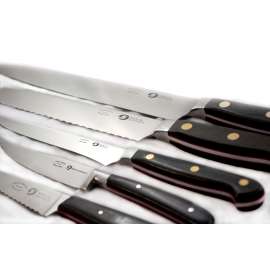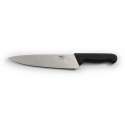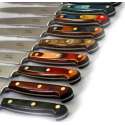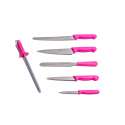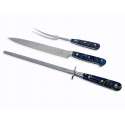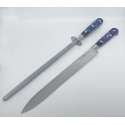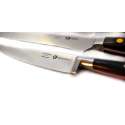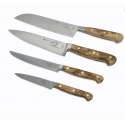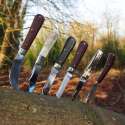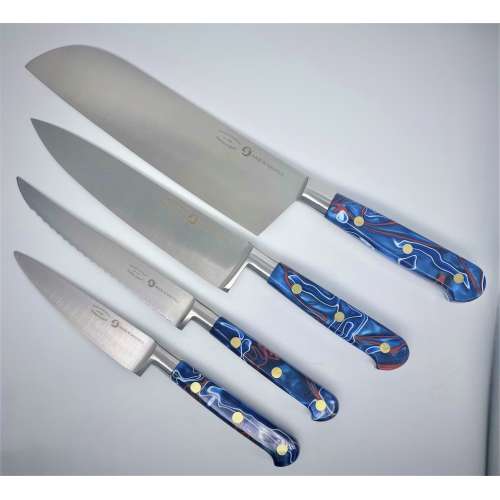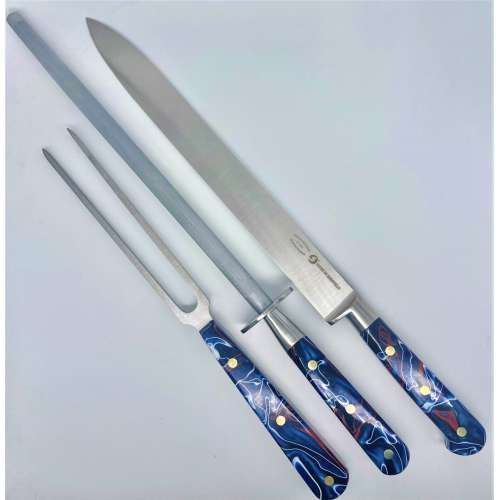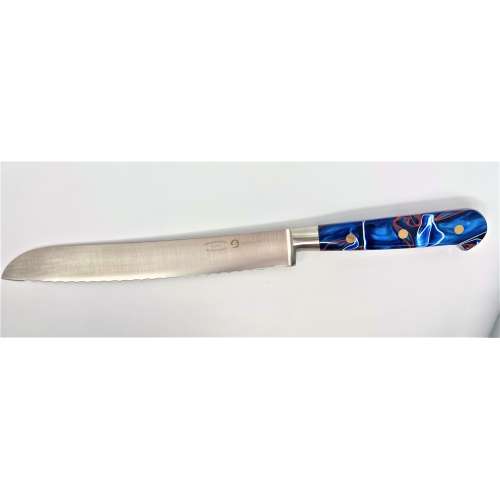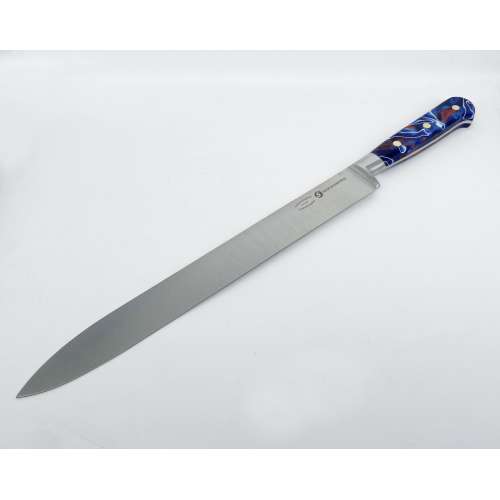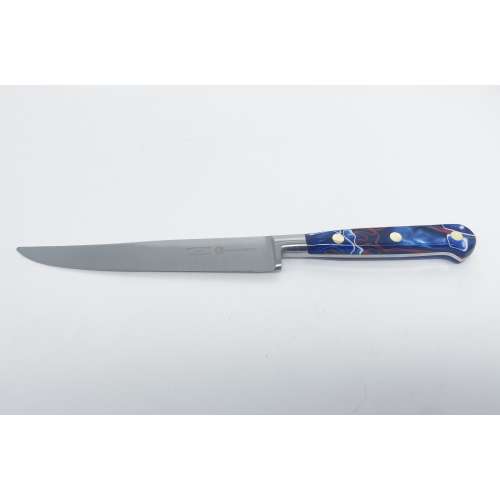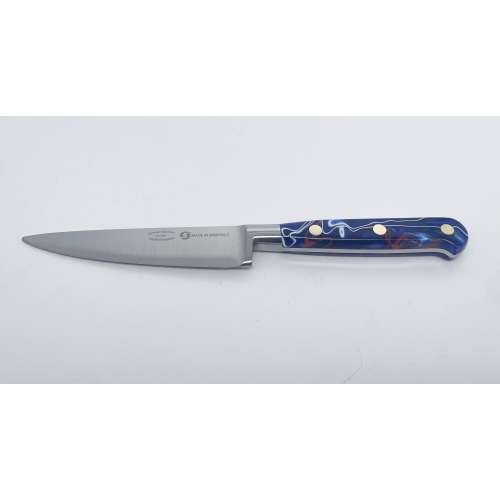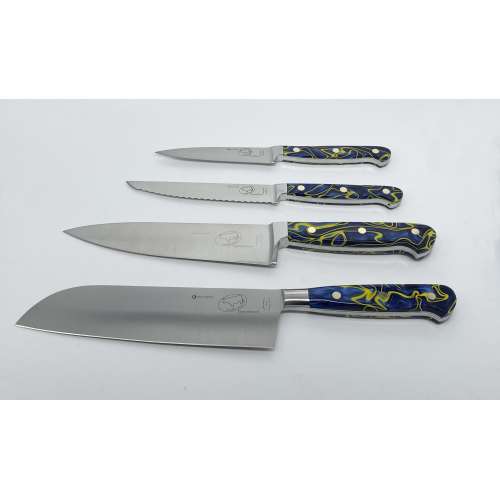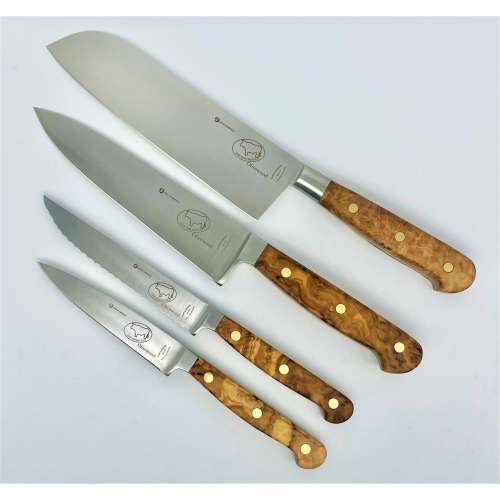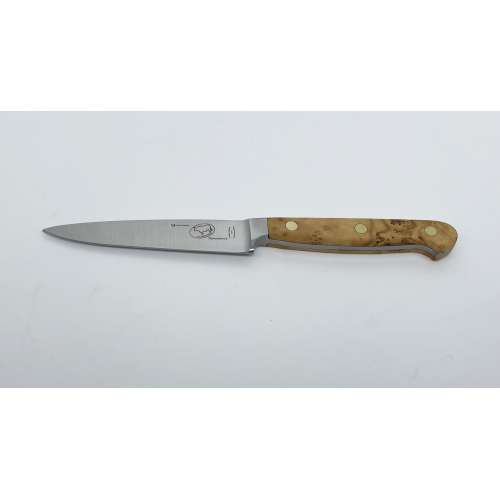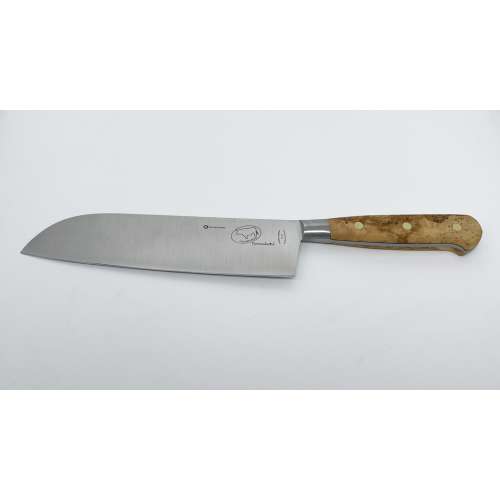No products
Product successfully added to your shopping cart
There are 0 items in your cart. There is 1 item in your cart.
Knife Collection
Here at Samuel Staniforth, we offer something for everyone! Our extensive knife collection ranges from our Samprene collection to our unique sets, such as our Specialist Woods or Pretty in Pink range. If you’re searching for a more traditional style knife, it may be worth taking a look at our Smithfield ‘Chef’ range. On the othe...
Knife Collection
Here at Samuel Staniforth, we offer something for everyone! Our extensive knife collection ranges from our Samprene collection to our unique sets, such as our Specialist Woods or Pretty in Pink range. If you’re searching for a more traditional style knife, it may be worth taking a look at our Smithfield ‘Chef’ range. On the other hand, if you’re hoping to find a knife that will stand out against the crowd, check out our vibrant pink and blue knife sets.
We understand that there is a lot more to the culinary arts than just simple food preparation. For some of you, cooking is your passion, your hobby, your way of life and even an art form. Most of all, cooking should be an enjoyable, stress-free experience.
Selecting the appropriate kitchen utensil is a crucial factor in ensuring cooking remains enjoyable. At Samuel Staniforth, we can provide the correct tool for any job. Professional chefs can choose between our beautifully balanced knives, which combine performance with beauty whilst amateurs can enjoy some of our stunning colourful knife collections, adding something a bit different to their kitchens.
Regardless of what you are looking for, we are here to help you find the perfect knife for the task. No carrot is too tough, no roast too large. Take a look at our large knife collection below to find the right one to suit you!
Why Choose From Our Knife Collection
Quality - Every knife manufactured at Samuel Staniforth is crafted using care and precision. This guarantees that all of our customers are satisfied with their handcrafted knives.
Tradition/Family Owned - At Samuel Staniforth, we are a close-knit team of experts committed to creating a range of exquisite knives steeped in the heritage of utmost quality.
Experience - Established in 1864, Samuel Staniforth Ltd has over 150 years of experience in the production of quality forged Sheffield made knives. As a result, we are able to produce quality products with speed and efficiency.
Value for money - By combining our years of experience with our manufacturing skills, you can rest assured that you’ll receive your handcrafted knife at an excellent value.
Customisable - This is what sets us apart from other knife makers. At Samuel Staniforth, we are completely flexible when it comes to customising our products. We’ll collaborate with you directly to craft the perfect knife to meet your requirements, giving you complete freedom to choose.
Knife Collection FAQs
What Is The Most Popular Type of Knife Collection?
As its name suggests, the chef’s knife is one of the most commonly used and versatile tools utilised in the kitchen. They are typically between 8-10 inches and can be used for a wide range of tasks, such as dicing vegetables or butchering poultry.
How To Recognise a Good Knife?
Before choosing a new knife, it is important to understand the hallmarks of quality. These include:
Material - X50CrMoV15 or 1.4116 Steel has been the hallmark of good European knives for over 50 years. This knife steel guarantees absolute sharpness and satisfies the highest hygienic requirements.
Manufacturing - A forged knife consists of a single piece of steel. This can be identified by the angle, the thicker part between the blade and the handle. It is only this type of production that promises maximum stability and perfect balance.
Sharpness - Whilst every knife is expected to be sharp right from the start, only a good knife remains sharp.
Handle - Cutting is easier when a knife lies firmly in the hand. Ergonomically shaped handles made of high-quality plastic prevents dangerous slipping and hand fatigue.
What Exactly Is X50CrMoV15 Steel?
Also known as 1.4116, X50CrMov15 is a steel type produced by German manufacturer, ThyssenKrupp. It is mostly recognised for its ability to withstand corrosion and wear however, it is also notable for being simple to sharpen and for its moderate edge retention.
What Are The Benefits of X50CrMoV15 Steel?
The perfect kitchen knife material should have a balance of the desired qualities. X50CrMoV15 steel is an ideal choice due to its high corrosion resistance, ease of sharpening and hardness. Here is everything you need to know:
Corrosion Resistance - The 1.4116 steel has a chromium content of 15%, making it corrosion resistant. As a result, the steel is extremely hygienic when it comes to food safety and is perfect for professional settings.
Edge Sharpness - The moderate amounts of carbon in X50CrMoV15 make it a relatively easy steel to sharpen.
Hardness - X50CrMoV15 steel has a Rockwell hardness of 54-57 HRC, making it a low hardness steel. This near-perfect middle ground makes the steel both tough and durable, not so soft or brittle that it cannot withstand tough use and not so hard that it’s difficult to sharpen.
Why Is The Weight of a Knife Important?
When it comes to knives, weight is very important. If you are looking for something to cut hard ingredients like potatoes, a heavier-weight knife is a good option. However, if you are looking for a tool to cut delicate ingredients like tomatoes and soft fruits, a lightweight knife would be a better option.
Knife Ranges There are 157 products.
Subcategories
Samprene Knives
Samprene Knives
The Smithfield ‘Samprene’ range is our most comprehensive range of knives at Samuel Staniforth. Made using polypropylene handles, our samprene knives are available in a range of colours to suit various foodstuffs, designed to help prevent cross contamination of food.
The ‘Samprene’ handle is made using high-tech machinery and materials in the plastic industry. This new variant of plastic has been designed and developed to combine both the strength and durability of polypropylene with the softness and serenity of rubber. The result, a knife with the perfect combination of outstanding strength and lasting comfort. The blades themselves are made using high quality 420 stainless steel that has added Molybdenum. This gives the steel excellent edge retention, high durability and exceptional rust resistance.
Sharpened to a 16 degree angle each side and heat treated to a Rockwell hardness of 58, our samprene knives feature a razor sharp edge that is durable enough to handle anything a professional setting can throw at it. Made using a huge range of colours, you’ll be pleased to know that our samprene knives include all of the colours required for a HACCP plan.
Colour chart for HACCP:
RAW MEAT
RAW FISH
COOKED MEAT
SALAD AND FRUITS
VEGETABLES
DAIRY
ALLERGENS
Samprene Knives FAQs
Which Chopping Board Should I Use With My Samprene Knife?
We recommend using wood or plastic chopping boards only. Avoid steel, ceramic, glass, or stone as these will blunt your samprene knives.
How To Take Care Of Your Samprene Knife
At Samuel Staniforth, our top tips for taking care of your samprene knife include:
Always keeping your knife dry and clean
Hand washing your knife with warm, soapy water
Never putting your knife in the dishwasher or leaving it soaking in water
Drying your knife completely using an absorbent towel
All stainless steel contains some level of carbon. If knives are not cleaned and dried properly, light hueing can occur. We recommend storing your knives on a magnetic wooden block, keeping it protected in a sheath or storing them in a knife roll or wrap.
What Is The Difference Between Honing and Sharpening Knives?
Honing and sharpening knives are very different things. Honing removes a very minimal amount of material from a knife’s edge and is more about moving a still sharpened edge back into alignment. This incorrect alignment occurs when the knife gets bent out of shape during use. *Bear in mind that most steels you see are honing steels, not sharpening steels.
Alternatively, sharpening is about removing material from a completely dull edge. Whilst nothing beats having freshly sharpened knives, remember that every time you sharpen your knife, it removes material from the blade. Over time, this can remove too much of the blade and affect the knife’s ability to cut well.
A common mistake people make is sharpening their knives too often and not honing them enough. At Samuel Staniforth, we recommend that you hone your knives regularly so that you don’t have to sharpen them as often. As a result, your knives will last a lot longer whilst feeling just as sharp. Take a look at our honing and sharpening steels to find out more.
What Is Your Best Selling Samprene Knife?
Our range of curved boning knives is our biggest seller. We sell 20,000 a year to abattoirs all over the world including the USA and New Zealand
Chef
Kitchen Knives
Please note that all knives are made to order.
Our Smithfield ‘Chef’ range is a superb range of fully forged, hand-finished kitchen knives, handcrafted by craftsmen with a wealth of knowledge and experience in the trade. The knives boast a traditional style of Sheffield knives which includes the fully forged blade alongside brass rivets, which are secured by hand. This ensures that the handle is permanently secured to the tang. Our chef range also features a round bolster which counterbalances the knife to ensure it can be the perfect ally in the kitchen.
We offer a range of quality kitchen knives, from our unique 7-inch santoku knife to our limited edition Sheffield United chef knife, there is something for everyone! We also offer 4 piece kitchen knife sets if you’re looking to get fully kitted out.
Take a look at our high-quality kitchen knives below to find the right fit for you!
How Are Our Kitchen Knives Made?
Our kitchen knives are hot forged from a single piece of high carbon stainless steel X50MoV15 and precision ground to produce an end product that exhibits exceptional sharpness. Each knife is perfectly balanced, meaning that every action will feel effortless.
All of our forged blades are sharpened to 16 degrees on each side giving a razor-sharp edge that is also durable enough to withstand any professional setting. We offer handles in either traditional rosewood or black, which is then finished by hand to create a satin finish. The end result is a kitchen knife that is both solid and durable, whilst providing the perfect balance and handling required by the most demanding chefs in the industry.
Different Types of Kitchen Knife
Chef’s Knife
Chefs’ knives are used for dicing, slicing and chopping small to medium-sized ingredients such as herbs, vegetables, meat and fish. Chefs’ knives are usually the most used knife in the kitchen and are perfect for that rocking chopping motion.
Santoku Knife
Santoku roughly translates to ‘three virtues’. This is significant as a santoku knife can perform three certain tasks, (among its other attributes) splendidly. The knife has marvellous chopping, cutting and dicing abilities. Santoku has a more straight blade than a chef’s knife which allows for a more ‘up-and-down’ cutting motion.
Utility Knife
A utility knife is a highly versatile, multi-functional knife. It can be described as something in between a paring knife and a chef’s knife. They are fantastic for medium-sized jobs, like chopping small fruit, shallots, sandwiches or other things where a chef’s knife feels too big.
Paring Knife
Paring knives are ideal for peeling and slicing fruits and vegetables as well as intricate tasks such as segmenting citrus fruit. You can also get serrated paring knives (occasionally called tomato knives) which are great for easily cutting through the skin of tomatoes.
The Anatomy of a Kitchen Knife
In order to simplify the different parts of a kitchen knife, we’ve put together a set of basic definitions:
Belly - This is the part of the knife that is curved. Generally, Western-style knives tend to have a fuller belly as they’re used for a more rocking chopping motion whereas Eastern-style knives tend to have less of a belly. This is because Eastern-style knives are typically used in a straight downward motion.
Bevel Edge - It’s important to note that different types of knives will have different edges and may or may not be sharpened on both sides. Bevel edge refers to a knife that is sharpened at a sharp angle on one side.
Heel - This refers to the widest part of the knife where the blade meets the handle. It is most commonly used to chop hard items such as carrots, nuts or vegetables.
Point - This part of the blade is not used so much for chopping foods but for piercing or scoring the surface of food when preparing.
Spine - The spine refers to the top of the blade and is not used for chopping.
Tip - Not to be confused with the point, the tip of the knife is ideal for more delicate and precise cuts where less pressure is needed.
Kitchen Knife FAQs
How Many Kitchen Knives Should I Have?
If you are just starting your knife collection, we recommend investing in a few essentials that will cover your most basic kitchen tasks. These include:
Paring Knife - For topping and tailing vegetables and prepping small ingredients
Chef's Knife - A larger knife, for chopping bulky root veg, dicing and cross-chopping herbs or finely-diced meat.
Bread Knife - For tomatoes or peppers that have a shiny, slightly tough skin.
What Are The Most Common Kitchen Knife Handle Materials?The most common kitchen knife handle materials include:
Wood - Wood is the material most commonly used to make knife handles - specifically hardwood. This is because it is naturally non-slip, warm, comfortable to the touch and aesthetically pleasing.
Plastic - Knives with plastic handles are most commonly found in commercial kitchens because they are the easiest to clean, most non-slip and therefore the safest and most sanitary. They also tend to be cheaper than wood knives.
Composite - Composite handles are often made of a mixture of resin and wood, so you get the wood effect without the maintenance.
Metal - Metal is a more uncommon choice of material for a knife handle, however, it is a very durable option. It requires no upkeep other than regular washing, they tend to be produced from one piece of metal which means they are virtually impossible to break. It should be noted however that these knives can be more dangerous as they become more slippery when the handle gets wet or oily.
What Is Material Hardness?
When talking about knives, material hardness refers to the hardness of the steel, which is measured in something called the Rockwell scale (HRC). Generally, knives range from about 52 to 58, with some very premium knives going as high as 64. As you may have guessed, the higher the number, the harder the steel. A harder steel will keep a sharp edge for longer, however, it will also be more work when you sharpen it to get the edge back.
On the flip side, a softer steel will need to be sharpened more often, but it will be much easier to get the sharp edge back. There are some disadvantages of having a knife made of very hard steel. Unfortunately, the thin edge is sensitive and can chip if used improperly or on harder to cut materials like raw squashes and potatoes
What Are Sharpening Angles?
Typically, there are two options for the angle a blade is sharpened to. Western-style knives have previously been sharpened to about a 22-degree angle and Eastern knives to about 15-16 degrees. However, you will likely find that most knives, both Western and Eastern styles, are sharpened to about a 15 degree angle nowadays.
The Eastern style knife tends to have a finer angle because of the cuisine that is often cooked in that area of the world, softer vegetables and meats. Alternatively, in the Western world, people tend to eat more root vegetables and tougher meats, which require a slightly wider angle.
What Is The Difference Between a Chef’s Knife and a Santoku Knife?
A santoku knife has a more straight and flat blade than a chef’s knife which allows for a more ‘up-and-down’ cutting motion, rather than the rocking motion we mostly use in Europe. A santoku knife will do the same things as a chef’s knife so it's completely up to you which one you prefer.
Will a Dishwasher Harm My Kitchen Knives?
Yes. Putting your kitchen knives in the dishwasher will 100% harm your kitchen knives. This is because the conditions of a dishwashing machine are too adverse. High heat, high-pressure jetting, and corrosive concentrated detergents will wreak havoc on handles, and connection points and possibly cause rusting, even on stainless steel. It's always best to wash your knives with warm soapy water, rinse them, and then dry them before putting them away.
Professional
Professional Chefs Knives
Please know all knives are made to order.
A range of truly top quality knives made to meet the requirements of the top professional chefs in the world.
Knives are forged using handcraftsmanship to produce the strongest, sharpest blade. High carbon steel (X50MoV15) is used for its strength and toughness, also known for its excellent corrosion resistance and high durability. The professional range also features a square bolster, which as well as ensuring the knife is perfectly balanced, improves grip and acts as a protective shield function. Handles are made up of either black polyacetate scales secured by hand with brass rivets.
Samuel Staniforth Professional knives are beautifully balanced - a fantastic range of knives for its price.
Dymond Wood
Dymond Wood Knives
Please know all knives are made to order.
We are proud to present an exquisite range of professional knives that combines both performance and beauty, to create what truly is a work of art.
To create a piece of art you expect the best artists. All knives are crafted by hand by highly experienced, highly trained craftsmen that have, over many years, acquired a vast amount of knowledge in the trade.
These knives don't just walk-the-walk they can certainly talk-the-talk as well. DymondWood is not just a pretty face, it is also highly durable and resistant to wear. These knives will last you a lifetime.
Each blade is fully forged from a single billet of the finest stainless steel then hand finished to achieve the sharpest cutting edge. Knives are manufactured to meet the demands of the professional chef, in which handling, balance and durability are paramount. Each knife features a beautifully crafted Dymond Wood handle.
Knives are available in an extensive range of colours to suit all requirements. Pieces can be ordered individually to build up a single colour set, or alternatively in different finishes to create an eclectic mix.
Pretty in Pink
Pink Knife Set
For something a little bit different. A Unique Range of Knives with a rather fetching Pink Handle. Do you dare to be seen in pink?
Ocean Blue
Blue Handled Knives
Please know all knives are made to order.
Try something a little different. Our new range of stunning Ocean Blue handles. These will stand out in any knife set.
Royal Blue
Blue Kitchen Knives
Please know all knives are made to order.
Try something a little different. Our new range of stunning Royal Blue handles. These will stand out in any knife set.
150 Range
150 Knife Range
Please know all knives are made to order.
Brought in to celebrate our 150th anniversary in 2014. The 150 range is a stunning set of forged knives finished off with handles made from black micarta with a red inlay.
Specialist Woods
Traditional Wood Handle Knives
Please know all knives are made to order.
Our knife ranges but done with Traditional woods handles
Heritage - Sheffield...
Heritage Knives
At Samuel Staniforth, we take great pride in our heritage of fine cutlery craftsmanship. At the heart of a city renowned for its cutlery industry, Samuel Staniforth has garnered a reputation for producing exceptional Sheffield steel knives that stand the test of time. Whether it's for butchers, caterers, professional or home chefs, we continue to build upon Sheffield’s rich history, combining the finest materials with time-honoured techniques.
Our Sheffield steel knives combine traditional materials sourced in Sheffield, the home of British knife making, with the most modern new technology production methods. The result? A knife that is equally at home in a modern or traditional kitchen. Choose from our selection of heritage cooks’ knives or if you’re looking to get fully decked out, take a look at our exquisite 4-piece heritage set.
Take a look at our exceptional Sheffield steel knives below to find the right one for you!
True Sheffield Steel Knives
All of our heritage knives carry the MADE IN SHEFFIELD mark, which guarantees superior craftsmanship and quality. In fact, our full tang heritage knife is made from SF 100 Sheffield stainless steel, hardened to 61 HRC (Rockwell) which creates a knife with ultimate durability, ease of sharpening and edge retention.
The Sheffield steel knives use polished, sustainably sourced curly birch handles and brass rivets. This unique pattern in the material is enhanced through a process of vacuum sealing with cacti juice that darkens and stabilises the wood. To finish the overall aesthetic, the knives’ handles are made using Sheffield cast brass bolsters, making them both attractive and durable.
Why Choose Our Heritage Sheffield Steel Knives
Full Tang For Strength & Durability - In our opinion, the mark of a high-quality knife is when the metal runs through the entirety of the knife from the point of the tip to the butt of the handle. This full tang design creates a knife that is well-balanced for comfort even after prolonged use. Its symmetry means it is suitable for both right and left-handed users.
Multi-Purpose Knives - These multi-purpose heritage cooking knives are ideal for carving poultry, lamb, beef or pork into thin slices. The non-serrated plain edge and long length is perfect for slicing through roasts with minimum effort.
Complete Set - If you’re looking for a housewarming gift or wedding present, our 4-piece heritage set is the perfect option. The set includes a bread knife and three different-sized cooks’ knives, ranging from 4 to 9 inches.
Beautiful Design - The traditional antique brass rivets offset by the modern silver-coloured sheen of the blade, mix the old with the new, creating a knife that suits both contemporary and traditional kitchens.
Heritage Steel Knives FAQs
What Is Sheffield's History With Knives?
For over 7 centuries, Sheffield has been renowned for its steel, producing everything from cutlery to industrial knife blades. One of the earliest literary mentions of Sheffield’s steel production appeared in Geoffrey Chaucer’s The Canterbury Tales in the early 15th century. So, why is Sheffield so famous for its cutlery?
Metalworking and cutlery production has always been a key industry in Sheffield due to its proximity to nearby raw materials such as iron ore, coal, charcoal and stone for grinding wheels. Sheffield also has access to several fast flowing rivers in the Peak District to help power machinery.
By the 14th century, Sheffield was known for its production of knives. In fact, a Sheffield knife was actually found in the possession of Edward III at the Tower of London in 1340.
Fun fact - The first reference to cutlery made in Sheffield was in 1297, when the Hearth Tax Records include Robertus le Coteler - Robert The Cutler.
How To Recognise a Good Knife
Before choosing a new knife, it is important to understand the hallmarks of quality. These include:
Material - SF100 Sheffield stainless steel, hardened to 61 HRC (Rockwell) guarantees absolute sharpness and satisfies the highest hygienic requirements.
Sharpness - Whilst every knife is expected to be sharp right from the start, only a good knife remains sharp.
Manufacturing - A forged knife consists of a single piece of steel. This can be identified by the angle, the thicker part between the blade and the handle. It is only this type of production that promises maximum stability and perfect balance.
Handle - Cutting is easier when a knife lies firmly in the hand. Ergonomically shaped handles made of high-quality plastic prevents dangerous slipping and hand fatigue.
How To Take Care Of Your Heritage Knife
At Samuel Staniforth, our top tips for taking care of your heritage knife include:
Always keep your knife dry and clean
Hand wash your knife with warm, soapy water
Never put your knife in the dishwasher or leave it soaking in water
Dry your knife completely using an absorbent towel before putting away
All stainless steel contains some level of carbon. If knives are not cleaned and dried properly, light hueing can occur. We recommend storing your knives on a magnetic wooden block, keeping them protected in a sheath or storing them in a knife roll or wrap.
What Does The Made In Sheffield Trademark Signify?
‘Made in Sheffield is one of the world’s great brands, made famous internationally as a mark of origin and quality on the city’s manufactured products.’ At Samuel Staniforth, we are very proud to offer knives that carry the made in Sheffield mark, a symbol that continues to represent the city’s ongoing commitment to both quality and excellence.
Pocket Knives
Pocket Knives
Please allow 7-14 days before dispatch as all knives are made to order.
All of these pocket knives are individually hand crafted using methods passed down from generation to generation.
Every process, from blanking out the blades and springs, hardening and tempering, assembly, grinding and glazing and final polishing are done by our fellow cutlers, Arthur Wright, here in Sheffield.
We offer a range of pocket knives, each with a variety of handles.
3 piece Carving set Royal Blue 3 piece Carving set Royal Blue
(Please note knives are made to order).4 Piece Gourmet Ocean Blue Set 4 Piece Gourmet Ocean Blue Set
(Please note knives are made to order).Cook Knife Olive Cook Knife Olive
(Please allow 4-5 weeks before dispatch as knives are made to order).
Categories
Wishlist
Information
New products
-

Sourdough Knife
£ 125.00 -

Fairbairn Sykes Knife 1st Pattern polished blade brass handle
Polished carbon steel blade, brass knurled handle plus leg sheath.
£ 123.00 -

Fairbairn Sykes Knife 1st Pattern Black blade brass handle
Black carbon steel blade, black knurled handle plus leg sheath
£ 123.00 -

Fairbairn Sykes Knife 1st Pattern Polished blade & handle
Polished carbon steel blade, polished knurled steel handle plus leg sheath.
£ 120.00 -

Fairbairn Sykes Knife 1st Pattern Black blade & handle
Black carbon steel blade, black knurled handle plus leg sheath
£ 118.80 -

Fairbairn Sykes Knife 1st Pattern Polished blade, black handle
Polished carbon steel blade, black knurled steel handle plus leg sheath.
£ 118.80 -

-


